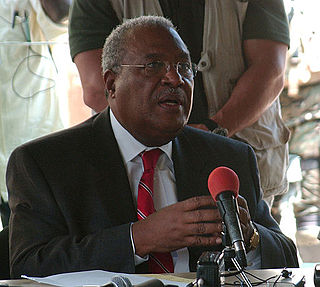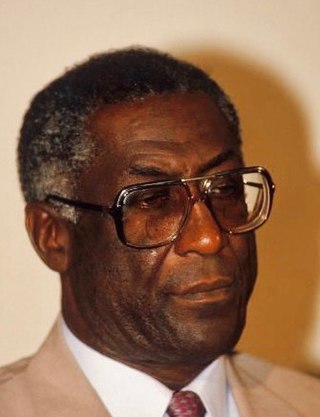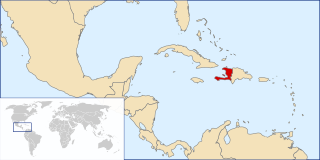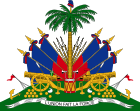
Haiti, officially the Republic of Haiti, and formerly known as Hayti, is a country located on the island of Hispaniola in the Greater Antilles archipelago of the Caribbean Sea, east of Cuba and Jamaica, and south of The Bahamas and the Turks and Caicos Islands. It occupies the western three-eighths of the island which it shares with the Dominican Republic. To its south-west lies the small Navassa Island, which is claimed by Haiti but is disputed as a United States territory under federal administration. Haiti is 27,750 km2 (10,714 sq mi) in size, the third largest country in the Caribbean by area, and has an estimated population of 11.4 million, making it the most populous country in the Caribbean. The capital is Port-au-Prince.
The recorded history of Haiti began in 1492, when the European navigator Christopher Columbus landed on a large island in the region of the western Atlantic Ocean that later came to be known as the Caribbean. The western portion of the island of Hispaniola, where Haiti is situated, was inhabited by the Taíno and Arawakan people, who called their island Ayiti. The island was promptly claimed for the Spanish Crown, where it was named La Isla Española, later Latinized to Hispaniola. By the early 17th century, the French had built a settlement on the west of Hispaniola and called it Saint-Domingue. Prior to the Seven Years' War (1756–1763), the economy of Saint-Domingue gradually expanded, with sugar and, later, coffee becoming important export crops. After the war which had disrupted maritime commerce, the colony underwent rapid expansion. In 1767, it exported indigo, cotton and 72 million pounds of raw sugar. By the end of the century, the colony encompassed a third of the entire Atlantic slave trade.

Jean-Bertrand Aristide is a Haitian former Salesian priest and politician who became Haiti's first democratically elected president. A proponent of liberation theology, Aristide was appointed to a parish in Port-au-Prince in 1982 after completing his studies to become a priest. He became a focal point for the pro-democracy movement first under Jean-Claude "Baby Doc" Duvalier and then under the military transition regime which followed. He won the 1990–91 Haitian general election, with 67% of the vote. As a priest, he taught liberation theology and, as a president, he attempted to normalize Afro-Creole culture, including Vodou religion, in Haiti.

The government of Haiti is semi-presidential republic, a multiparty system wherein the President of Haiti is head of state elected directly by popular elections. The Prime Minister acts as head of government and is appointed by the President, chosen from the majority party in the National Assembly. Executive power is exercised by the President and Prime Minister who together constitute the government. Legislative power is vested in both the government and the two chambers of the National Assembly of Haiti. The government is organized unitarily, thus the central government delegates powers to the departments without a constitutional need for consent. The current structure of Haiti's political system was set forth in the Constitution of March 29, 1987.
Joseph Raoul Cédras is a Haitian former military officer who was the de facto ruler of Haiti from 1991 to 1994.

Fanmi Lavalas, is a social-democratic political party in Haiti. Its leader is former Haitian President Jean-Bertrand Aristide. It has been a powerful force in Haitian politics since 1991. Fanmi Lavalas governments advocate a policy of "growth with equity" based on Western European social democratic principles. Fanmi Lavalas governments have emphasised investment in education and health care as their priorities and have refused International Monetary Fund austerity measures.

A coup d'état in Haiti on 29 February 2004, following several weeks of conflict, resulted in the removal of President Jean-Bertrand Aristide from office. On 5 February 2004, a rebel group, called the National Revolutionary Front for the Liberation and Reconstruction of Haiti, took control of Haiti's fourth-largest city, Gonaïves. By 22 February, the rebels had captured Haiti's second-largest city, Cap-Haïtien and were besieging the capital, Port-au-Prince by the end of February. On the morning of 29 February, Aristide resigned under controversial circumstances and was flown from Haiti by U.S. military/security personnel. He went into exile, being flown directly to the Central African Republic, before eventually settling in South Africa.

Gérard Latortue was a Haitian politician and diplomat who served as the prime minister of Haiti from 12 March 2004 to 9 June 2006. He was an official in the United Nations for many years, and briefly served as foreign minister of Haiti during the short-lived 1988 administration of Leslie Manigat.
Jean Léopold Dominique was a Haitian journalist and noted activist for human rights and democracy in Haiti. His station, Radio Haiti-Inter, was the first to broadcast news, investigative reporting, and political analysis in Haitian Creole, the language spoken by most Haitian people. On 3 April 2000 he was assassinated as he arrived for work at Radio Haiti-Inter. An extensive though turbulent investigation failed to officially identify and bring to justice the primary perpetrators, who remain at large.

General elections were held in Haiti on 7 February 2006 to elect the replacements for the interim government of Gérard Latortue, which had been put in place after the 2004 Haiti rebellion. The elections were delayed four times, having originally been scheduled for October and November 2005. Voters elected a president, all 99 seats in the Chamber of Deputies of Haiti and all 30 seats in the Senate of Haiti. Voter turnout was around 60%. Run-off elections for the Chamber of Deputies of Haiti were held on 21 April, with around 28% turnout.

Marc Louis Bazin was a World Bank official, former United Nations functionary and Haitian Minister of Finance and Economy under the dictatorship of Jean-Claude Duvalier. He was prime minister of Haiti appointed on June 4, 1992 by the military government that had seized power on September 30, 1991.

In the administrative divisions of Haiti, the department is the first of four levels of government. Haiti is divided administratively into ten departments, which are further subdivided into 42 arrondissements, 145 communes, and 571 communal sections.

The following outline is provided as an overview of and topical guide to Haiti:

United Nations Security Council Resolution 841, adopted unanimously on 16 June 1993, after recognising the need for an urgent settlement to the situation in Haiti and the efforts of the Secretary-General of the United Nations Boutros Boutros-Ghali and the Secretary General of the Organization of American States João Clemente Baena Soares, the Council placed various international sanctions on Haiti.

The 1991 Haitian coup d'état took place on 29 September 1991, when President Jean-Bertrand Aristide, elected eight months earlier in the 1990–91 Haitian general election, was deposed by the Armed Forces of Haiti. Haitian military officers, primarily Army General Raoul Cédras, Army Chief of Staff Philippe Biamby and Chief of the National Police, Michel François led the coup. Aristide was sent into exile, his life only saved by the intervention of US, French and Venezuelan diplomats. Aristide would later return to power in 1994.

The chiefdoms of Hispaniola were the primary political units employed by the Taíno inhabitants of Hispaniola in the early historical era. At the time of European contact in 1492, the island was divided into five chiefdoms or cacicazgos, each headed by a cacique or paramount chief. Below him were lesser caciques presiding over villages or districts and nitaínos, an elite class in Taíno society.

Jovenel Moïse was a Haitian entrepreneur and politician, who served as the 43rd President of Haiti from 2017 until his assassination in 2021. He was sworn in as president in February 2017 after winning the November 2016 election. In 2019, protests and unrest in Haiti became a crisis. In the early morning of 7 July 2021, Moïse was assassinated, and his wife Martine was injured during an attack on their private residence in Pétion-Ville. Claude Joseph took control of the country as acting prime minister following the assassination of Moïse.

The Indigenous Army, also known as the Army of Saint-Domingue or Lame Endijèn in Haitian Creole, was the name bestowed to the coalition of anti-slavery men and women who fought in the Haitian Revolution. Encompassing both black slaves, maroons, and affranchis, the rebels were not officially titled the Armée indigène until January 1803, under the leadership of then-general Jean-Jacques Dessalines. Predated by insurrectionists such as François Mackandal, Vincent Ogé and Dutty Boukman, Toussaint Louverture, succeeded by Dessalines, led, organized, and consolidated the rebellion. The now full-fledged fighting force utilized its manpower advantage and strategic capacity to overwhelm French troops, ensuring the Haitian Revolution was the most successful of its kind.

Little is known about the early history of Haitian license plates. Keith Marvin thought that the earliest plates were from the early 1930s, but older plates have since been found and at least one plate from 1923 exists. Early plates were marked with Rd'H,, HA., RH, or Haïti at various times. The Haitian coat of arms appeared on the plates from 1998 to 2002, the country flag was shown on the 2002 - 2005 plates, and since 2006 the background has shown a map of the country. With the last update on the design, the slogan La perle des Antilles was added at the bottom of the plate in white colour.













